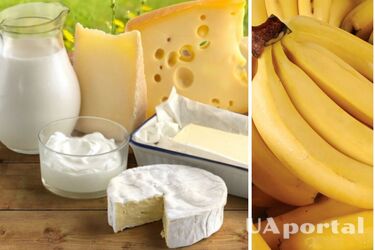What and when to eat at night for good sleep

BLOG
Good sleep is extremely important for overall health. It reduces the risk of developing certain chronic diseases, keeps the brain healthy, optimizes metabolism, and strengthens the immune system. It is generally recommended to get 7 to 9 hours of uninterrupted sleep every night, although not everyone is able to do so.
There are many strategies to improve sleep quality. In particular, these are dietary changes, as some foods and drinks promote healthy sleep. Here are 9 of the best foods to eat for dinner that improve sleep quality.
ALMOND
Thirty grams of dry roasted nuts (the recommended daily amount) contains 18% of an adult's daily phosphorus requirement and 23% of riboflavin. This portion of almonds meets 25% of the daily manganese requirement for men and 31% for women. Regular consumption of these nuts is associated with a reduced risk of certain chronic diseases, such as type 2 diabetes and heart disease, due to the healthy monounsaturated fats, fiber, and antioxidants found in these nuts.
Almonds are a source of the hormone melatonin, which regulates the internal clock and signals the body to prepare for sleep. In addition, almonds contain magnesium (30 grams - 19% of the daily requirement). Consuming enough magnesium helps improve sleep quality, especially for those who suffer from insomnia. It is believed that magnesium's role in improving sleep is related to its ability to reduce inflammation. In addition, it reduces levels of the stress hormone cortisol, which interferes with sleep. One study examined the effects of 400 mg of almond extract on rats. It was found that after consuming it, the rats slept longer and deeper than without it.
TURKEY
Turkey meat is rich in protein, which is important for maintaining muscle strength and regulating appetite. In addition, turkey is a source of vitamins and minerals, such as riboflavin, phosphorus, and selenium (100 grams contains 56% of the daily value of this mineral).
Turkey meat has several properties that explain why some people feel tired after eating it or believe that it causes drowsiness. In particular, it contains the amino acid tryptophan, which increases melatonin production. In addition, there is evidence that consuming a moderate amount of protein at bedtime is associated with better sleep quality, including fewer awakenings during the night.
CHAMOMILE TEA
The popular herbal tea contains flavones, and antioxidants that reduce inflammation, which often leads to chronic disease. There is also some evidence that drinking chamomile tea can strengthen the immune system, reduce anxiety and depression, and improve skin health.
Chamomile tea has some unique properties that improve sleep quality. In particular, it contains apigenin. This antioxidant binds to certain receptors in the brain to induce drowsiness and reduce insomnia. A 2011 study of 34 adults found that those who consumed 270 mg of chamomile extract twice daily for 28 days fell asleep 15 minutes faster and woke up less at night compared to those who did not. In another study, women who drank chamomile tea for two weeks reported improved sleep quality compared to those who did not. They also had fewer symptoms of depression, which is commonly associated with sleep problems.
KIWI
One fruit contains only 42 calories and a significant amount of nutrients, including 71% of the daily value of vitamin C, 23% and 31% (for women and men, respectively) of the daily requirement of vitamin K, as well as some folic acid and potassium. Eating kiwifruit is good for digestion, effectively eliminates constipation, reduces inflammation, and lowers cholesterol. These effects are due to the high content of fiber and carotenoid antioxidants in these fruits.
According to some studies, kiwi is one of the best foods to eat before bed. In a four-week study, 24 adults ate two kiwis every night, one hour before bedtime. At the end of the study, participants fell asleep 42% faster than when they ate nothing before bed. In addition, their ability to sleep through the night without waking up improved by 5%, and their total sleep time increased by 13%.
The sleep-promoting effect of kiwi is sometimes attributed to serotonin, which helps regulate the sleep cycle. Researchers suggest that the anti-inflammatory antioxidants in kiwifruit, such as vitamin C and carotenoids, may also be partly responsible for the beneficial effects of this fruit on sleep quality. Eating 1-2 medium kiwis in the evening can help you fall asleep faster and stay asleep longer.
TART CHERRY JUICE
It provides small amounts of several important nutrients such as magnesium and phosphorus. It is a good source of potassium and antioxidants, including anthocyanins and flavonols.
Tart cherry juice promotes drowsiness, and its role has even been studied in relieving insomnia. This effect is attributed to its high melatonin content. In a small study, adults with insomnia consumed 250 ml of tart cherry juice twice a day for two weeks. They slept 84 minutes longer and reported better sleep quality compared to when they did not drink the juice.
SEA FISH
Salmon, tuna, trout, mackerel, and other oily fish are incredibly healthy. They contain exceptional amounts of vitamin D and many healthy omega-3 fatty acids that protect against heart disease and improve brain health. The combination of omega-3 fatty acids and vitamin D in oily fish potentially improves sleep quality because they increase serotonin production.
In one study, men who ate 300 grams of Atlantic salmon three times a week for 6 months fell asleep about 10 minutes faster than men who ate chicken, beef, or pork. This effect was thought to be due to vitamin D. Those who ate fish had higher levels of this vitamin, which was associated with a significant improvement in sleep quality.
WALNUTS
Provide the body with more than 19 vitamins and minerals, as well as fiber (1.9 grams per 30 grams). Walnuts are especially rich in magnesium, phosphorus, manganese, and copper. They are also an excellent source of healthy fats, including omega-3 fatty acids and linoleic acid. They also contain protein (4.3 grams per 30 grams), which is useful for reducing appetite.
Thanks to their ability to lower high cholesterol, walnuts have a positive effect on heart health. Some researchers claim that eating walnuts improves sleep quality, as they are one of the best dietary sources of melatonin.
The fatty acid composition of walnuts also contributes to better sleep. They provide alpha-linolenic acid (ALA), which is converted into docosahexaenoic acid (DHA) in the body, which increases serotonin production.
PASSIONFLOWER TEA
A rich source of flavonoid antioxidants that reduce inflammation, strengthen the immune system and reduce the risk of cardiovascular disease. Researchers have studied the potential of passionflower tea to reduce anxiety. For example, the antioxidant apigenin has a calming effect by binding to certain receptors in the brain. There is also some evidence that passionflower increases the synthesis of gamma-aminobutyric acid (GABA) in the brain.
GABA suppresses other brain chemicals that cause stress, such as glutamate.
The calming properties of passionflower tea contribute to drowsiness. In a 7-day study, participants drank a cup of passionflower tea before going to bed. They rated the quality of their sleep significantly better when they drank the tea compared to when they did not drink the tea.
WHITE RICE
The main difference between white and brown rice is that the bran and germ have been removed from white rice. Because of this, it has less fiber, nutrients and antioxidants. However, white rice still contains a certain amount of several vitamins and minerals. For example, 80 grams of rice provides 19% of the daily requirement for folic acid and 20-21% for thiamine.
Due to its high carbohydrate content and lack of fiber, white rice has a high glycemic index (GI). It is an indicator of how quickly food increases blood sugar levels. Researchers have suggested that eating high GI foods, such as white rice, at least one hour before bedtime helps improve sleep quality. One study compared the sleeping habits of 1848 people depending on their consumption of rice, bread, or noodles.
Higher rice consumption was associated with better sleep than bread or noodles, including longer sleep duration. Despite the potential benefits of white rice for sleep, it is best consumed in moderation due to its low fiber and nutrient content.
OTHER FOODS THAT PROMOTE SLEEP
- Dairy products. Milk, cheese, and yogurt are sources of tryptophan. Milk has been shown to improve sleep in older adults, especially when combined with light exercise.
- Bananas. Banana peel contains tryptophan, and the fruit itself is a source of magnesium. Together, they help you get a good night's sleep.
- Oatmeal. Similar to rice, oatmeal is high in carbohydrates and low in fiber. In addition, oats are a source of melatonin.
To benefit from foods and drinks that improve sleep, it is best to consume them 2-3 hours before bedtime. Eating right before bed can cause digestive problems, such as acid reflux.
There is currently not enough research to say that a particular food will promote sound, healthy sleep in all people. You can try different foods for dinner, such as a cup of tea or a handful of nuts, to see which one improves your sleep quality.

